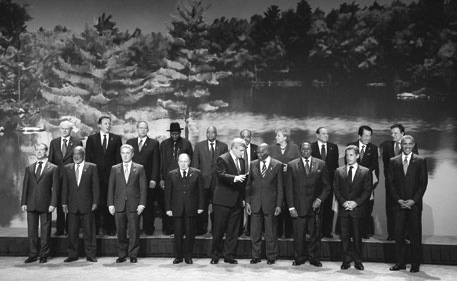Japan's Official Development Assistance White Paper 2010
Chapter 2 Concrete Steps for Achievement of MDGs
Five years from the MDGs deadline, Japan is taking concrete steps for the achievement of the MDGs.
2010 was a milestone year with five years remaining until the 2015 deadline for achieving the MDGs. On various occasions, beginning with the UN Summit on the MDGs held in New York from September 20 – 22 and the preceding G8 Muskoka Summit as well as the Special Ministerial Meeting for MDGs Review in Asia and the Pacific, the international community confirmed the importance of making enhanced efforts to meet the MDGs.
Japan’s assistance for the achievement of the MDGs by 2015 rests on the concept of “human security”. It focuses on each and every person and aims to realize the rich potential he or she possesses. It attaches importance to protecting people and communities from complexly intertwined threats and building capacity so that each individual can take the course of action he or she chooses.
At the UN Summit in September 2010, Japan announced new assistance policies in the areas of health and education — fields Japan attaches particular importance to. The new Global Health Policy 2011– 2015 is a comprehensive set of policies regarding assistance for health. In the area of maternal and child health, Japan, in collaboration with international organizations and other development partners, will provide assistance that offers seamless care from prenatal to postnatal care and will save the lives of pregnant women and newborns. Also, in regards to assistance for the three major infectious diseases, Japan will strive to significantly reduce the number of deaths through a combination of both contributions to the Global Fund to Fight AIDS, Tuberculosis and Malaria and bilateral assistance. Under Japan’s Education Cooperation Policy 2011– 2015 in the area of education, Japan, through contributions to international organizations and other means, will provide assistance for the development of basic education, based on the “School for All” assistance model aimed at providing education opportunities to all children.
Section 1 International Community's Actions and Japan's Efforts
With a view to achieving the MDGs, world leaders gathered for many meetings in 2010 to discuss development assistance, including the G8 Muskoka Summit (June) and the UN Summit on the MDGs (September).
1. G8 Muskoka Summit
The G8 Muskoka Summit was held in Muskoka, Canada from June 25 to 26, 2010, and Prime Minister Naoto Kan attended from Japan. Development has been one of the key G8 agenda items in recent years. At the Muskoka Summit, too, development was discussed at the meeting with the African Outreach leaders (Note 2), where all leaders shared the view that efforts must be strengthened to meet the MDGs.
The focus of the Summit was on “maternal and child health” — areas in which progress has been particularly slow. The G8 leaders launched the Muskoka Initiative for enhancing assistance for maternal and child health, and pledged to contribute an additional US$5 billion over the next five years under the Initiative. The leaders also called for the cooperation of other governments, international organizations, and developing countries themselves in order to build on the momentum of the G8’s assistance and translate it into larger global initiatives.
In light of the importance of improving maternal and child health also from the standpoint of “human security” on which Japan puts emphasis, Prime Minister Kan announced that Japan will provide additional assistance of up to ¥50 billion or approximately US$500 million over five years beginning in 2011 for maternal and child health under the Muskoka Initiative.

Group photo at the G8 Summit outreach meeting; Prime Minister Naoto Kan, back row, second from right (Muskoka, Canada) (Photo: AFP=Jiji)
Notes:
(2) Members: G8 (Japan, U.S., UK, Germany, France, Italy, Canada, Russia, EU), Algeria, Egypt (absent), Nigeria, Senegal, the Republic of South Africa, Ethiopia (Chair of the NEPAD Heads of State and Government Orientation Committee), Malawi (Chair of the African Union [AU]).
